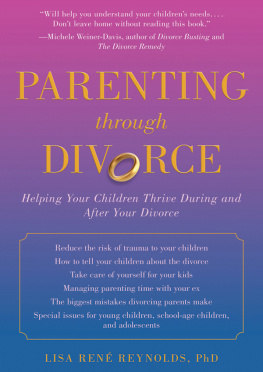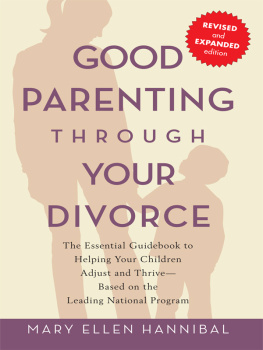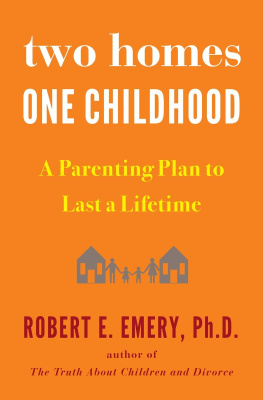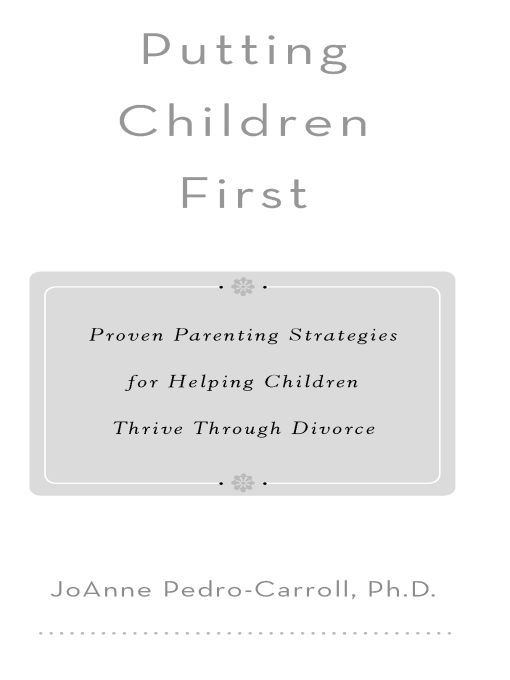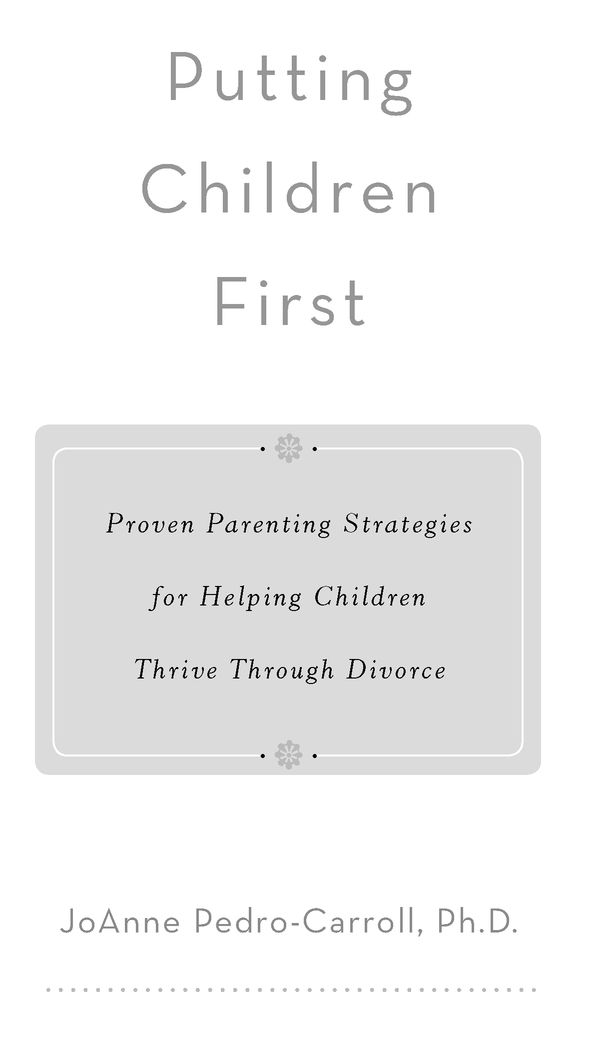Table of Contents
AVERY
a member of
Penguin Group (USA) Inc.
New York
This book is dedicated to the children and families
who have trusted me with their stories.
Their courage, hope, and, ultimately, resilience
are the inspiration for this book.
ACKNOWLEDGMENTS
This book would not have been possible without the help of many people along the way. Most notable among them is Laura McGrath, whose many talents include skilled writer, creative thinker, and collaborator par excellence. Lauras extraordinary professional skills, personal warmth, and integrity make me ever so grateful for her partnership in this endeavor. I thank my friend Cristine Chandler for connecting me with her.
Special thanks go to my agent, Brettne Bloom, who has provided energy and enthusiasm throughout this project and found a good home for it at Avery/Penguin. Lucia Watson, my clear-thinking editor, offered invaluable editorial guidance as well as compassionate understanding when I needed a deadline extension during my mothers final illness. Thanks to the rest of the wonderful team at Avery/Penguin, including Miriam Rich, Anne Kosmoski, Lisa Johnson, Jessica Chun, Megan Newman, and Bill Shinker.
I remain grateful to the William T. Grant Foundation, which supported my initial research on the development, implementation, and evaluation of the Children of Divorce Intervention Program. The foundation also supported my participation in the Consortium of Researchers on Children and Divorce, which gave me unparalleled opportunities to learn about cutting-edge research on children and divorce, and share ideas with some of the countrys leading researchers.
My late mentor, Dr. Emory Cowen, a pioneer in prevention research and a professor of psychology at the University of Rochester, was a source of wisdom, support, and knowledge, and heavily influenced my commitment to prevention research and practice. Im grateful to many colleagues at Childrens Institute for their support of my work developing and conducting research on programs for children and families. Research on the Children of Divorce Intervention Program would not have been possible without the support and cooperation of several schools in the greater Rochester, New York, area, including the Allendale-Columbia and Harley schools, and school districts in Brighton, ChurchvilleChili, East Irondequoit, East Rochester, Greece, Fairport, Ontario Center, Penfield, Pittsford, Rochester, Rush-Henrietta, Webster, West Irondequoit, and Williamson. Colleagues Drs. Linda Alpert-Gillis, Aaron Black, Sheryl Jones, Ellen Nakhnikian, Sharon Sterling, Sara Sutton, and Peter Wyman deserve special thanks for their contributions to the research and development of programs to help children and parents navigate the changes in their lives.
My work developing a parent education program would have been impossible without a collaborative partnership with the Honorable Evelyn Frazee, Justice, New York State Supreme Court, and the cooperation of New York State Unified Courts. Special thanks to Allison Osborn, Elizabeth Doyne, Lynn Delles, and Shannon Dortch for reading portions of this book and providing helpful comments, and to Peggy Brill for her thoughtful proofreading.
I am grateful to my late parents, Charles and Amelia Pedro, whose love and belief in me sustain me still. My beloved mother became ill and passed away during the writing of this book. Im thankful that I was able to take time away to care for her, and Im deeply grateful that my sisters, Donna Murphy and Carla Kania, were lovingly by my side throughout that process, in person or in spirit. My mother would often remind us to take care of ourselves, especially during stressful times. My message to parents is similar: We all need to care for ourselves and keep the balance in our lives so we can be our best, for ourselves and our children.
All children need someone who is their champion and always ready with a hug during the rough times in life, and my grandmother Philomena Pannunzio provided that loving presence in my life. It was she who taught me some of the most important life lessons, especially about love. Although she could neither read nor write and spoke very little English, she was truly literate in the art of loving family relationships. She had a profound influence on me, personally and professionally.
I have been blessed with a large and loving family of my own. My abiding gratitude goes to Roger, my husband and soul mate, for his unwavering support of my dreams and passion for my work and our family. What a gift it is to have a husband who is a best friend, confidant, and partner in every sense of the word. My profound thanks and love go to Chris, Shawn, Shannon, and Scott, for welcoming me into their family so many years ago, when I married their dad and got four wonderful children as part of the package. They and their families continue to bring us love and joy. And to our younger children, Kristen, David, and Michael, and our son-in-law Austin, I feel so lucky to have you all so near. Thank you for your support, encouragement, love, and laughterand for getting me out to play when I needed it! I have been blessed in love and in work. I am truly grateful.
To Begin ...
Eight-year-old Jessica sat in my office one rainy November day, drawing pictures as we talked through her feelings about all the changes in her family. Her thin body was curled up in the chair, and as she spoke, I marveled at how this small child carried such big adult burdens. Her parents had been separated for ten months, and she and her sister shared their time between their two homes. Jessica was very worried about her mom, who cried a lot and spent a lot of time on the phone, talking about all the bad things that are happening to our family.
Her parents, Carol and Paul, were embroiled in disputes over property and finances, and now they were contesting some of the custody arrangements. Jessica found a poster with facial expressions showing a wide variety of feelings and began to study it carefully. After a while she looked up and commented, Youre missing some feelings on this. When I asked her if she wanted to add to the poster, she wrote the word miserable and began to draw a stream of tears flowing down a deeply unhappy face. As she drew, she talked about how all the good stuff has gone away since her parents separation, like how they used to snuggle with me at night. Now they are always tired and grouchy and just talk about all the bad stuff. She described her sadness at the loss of family times togethersimple routines like sitting with Dad in his special chair at night while he read the comics to her.
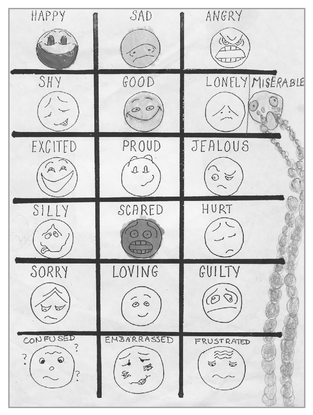
For Carol and Paul, divorce was the only solution to a marriage that had become increasingly bitter and unhappy. For Jessica, however, her parents divorce felt more like a problem than a solution. The upheaval and acrimony of the divorce had compounded her losses, eroding her precious time with both of them. Like the majority of children in her circumstances, Jessica was afraid to fan the flames of conflict or burden her parents further, so she never told them how she felt.
Jessica is typical of so many children I see in my practice. They internalize their feelings, not wanting to complicate matters further. They take on a huge burden of responsibility and guilt for their parents problems, often believing that if only they could be good enough, their parents would reconcile and their families would become whole and happy. As a way of protecting themselves from further disappointment and emotional pain when they lose secure family connections, many young people ultimately disengage from their parents, both emotionally and physically. Even as young children, they may withdraw from communication. As young adults, they may move out, sometimes putting hundreds or even thousands of miles between themselves and what was once their home.


